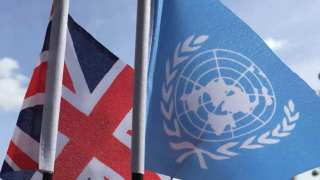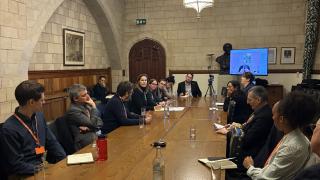
UNA-UK was founded in 1945 by British citizens who were passionate about global co-operation. Inspired, after years of war, by the rallying cry of peace, development and human rights for all, they pledged to support an organisation – the United Nations – that would bring countries together, confident that their government would play a leading role in delivering this vision.
Today, the UN is needed more than ever. In a world where localised conflict can have global repercussions, and where challenges such as climate change defy national action, it is more important than at any time since its founding. But the UN is also over-stretched and underfunded, in need of support from its member states.
UNA-UK believes that this country could make a real difference. It has the potential to build a better world by providing much-needed foreign policy leadership, and by setting an example at home, from protecting fundamental rights and freedoms to fostering a compassionate, outward-looking citizenry.
We have been concerned by the lack of interest from successive governments in setting out a compelling vision – and plan of action – for Britain’s global role. Recent commitments in the National Security Strategy to the UN, to aid and to peacekeeping signalled welcome re-engagement. We hope that this will be maintained during the period of uncertainty that will follow yesterday’s referendum on the UK’s membership of the EU.
As a UN-focussed charity, UNA-UK did not take a position on the referendum. We did, however, invite both campaigns to set out their views on how the referendum could affect the UK’s international influence – a key issue for us and a subject that barely featured in the discussions.
While Britain’s global role has changed considerably over the past century it remains, by most measures – wealth, trade, firepower – an influential country. This influence is now largely channelled through membership of the various groups that make up the international community, with the EU and the UN arguably being the most important.
And we took a strong position on the tone of the debate, condemning the disproportionate attention paid to immigration, widely acknowledged as one of the most influential issues for voters. Sadly, no amount of evidence-based analysis was able to reverse the negative narrative that few politicians have had the courage to reject. Those who voted in good faith to “take back control of our borders” are likely to be disappointed in the coming months, as freedom of movement will probably be necessary to secure a good UK-EU deal.
For UNA-UK, the referendum result will see us return to our original mission: making the case for global co-operation and global citizenship. It underlines even more firmly the role which UNA-UK should be playing across the country.
We believe that too little has been done to address the downsides of globalisation. It has boosted opportunities for trade and travel, but also our vulnerability to shocks, from bank defaults to disease outbreaks. It has increased knowledge and cultural exchange, and facilitated the spread of universal values. But it has left too many people behind and reduced the ability of governments to tackle traditionally domestic issues, such as fiscal balances and job creation.
Immigration has long been used by politicians of all stripes as the go-to excuse for their failure to address economic insecurity and inequality. Institutions, too, have become easy punching bags, as public trust in leadership has ebbed away. Many of us have narrowed our horizons, becoming more fiercely local and, at the extreme end, violent.
Across the world, governments have been reluctant to engage with this frustration, seeking to pacify it with ever-narrower national agendas. In Europe, many have buried their heads in the sand, leading to the rise of far right and far left movements. In other parts of the world, public discontent has resulted in uprisings, brutal crack-downs and the emergence of populist figures and governments.
All of this has weakened the international system that we have built over the past 70 years, and which has brought so many benefits to the UK. Indeed, the UK did much to create the international laws and institutions we have today, from the European Convention on Human Rights to the United Nations. It can best serve its interests, present and future, by investing in this system and ensuring that it delivers for the British public and the wider world.
In the coming months, UNA-UK will seek to engage all political parties in a debate on the UK’s global role going forward. We want to stimulate a positive conversation about what kind of country we want to be, and what kind of world we want to create. We echo the comments of the Foreign Affairs Committee Chair, who said that the Foreign & Commonwealth Office “needs to be equipped to reassert its leading role in foreign policy-making so that Britain can take its place on the world stage”.
We will work with our members and supporters around the country, who represented both sides in this debate, to build a progressive, outward-looking national narrative and to ensure that the values we all hold dear – peace, development and human rights for all – are high on the agenda.
And with the help of our local branches, we will reach out into communities across the UK to counter distrust in international institutions, and to offer an alternative vision of global co-operation. The world is simply too inter-connected to do anything else.
Please join us and support our movement: www.una.org.uk/donate






